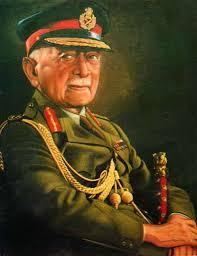K.M. Cariappa the first Indian commander-in chief of the Indian Army

Kodandera Madappa Cariappa, popularly known as K.M. Cariappa, was the first Commander-in-Chief of the country. He took over from General Roy Francis Butcher, the last British top commander of the Indian Army at the time of the British Raj, on 15 January 1949, the same day the whole country celebrates as Army Day. He also led the Indian Army on the western border in the Indo-Pak war of 1947.
He was born in 1899 in Karnataka and his father was a revenue officer in Kodandera Madikeri. All the people in the house used to call him affectionately as 'Chimma'. Cariappa had his initial education at Central High School in Madikeri. From the very beginning he was very good in studies. He loved maths and painting very much. After completing school education in the year 1917, he took admission in the Presidency College of Madras.
Along with being a promising student, he was also a good player in cricket, hockey, tennis. He is one of the two officers of the Indian Army who were given the rank of Field Marshal. Field Marshal Sam Manekshaw was the second officer to be given the rank of Field Marshal. Cariappa was called as 'Keeper'. He was the first Indian commander-in chief of the Indian Army. Ayub Khan, who became a Field Marshal and later President of Pakistan, worked under him in 1946.
US President Harry S. Truman honoured him with the 'Order of the Chief Commander of the Legion of Merit'. In 1986, the Government of India awarded him the post of 'Field Marshal' for his services rendered to the country with complete honesty. After retiring from the Indian Army in 1953, Cariappa worked as a High Commissioner in New Zealand and Australia from 1954 to 1956. Cariappa was the first Indian to train at the Imperial Defense College in Camberly,United Kingdom. He received the title of 'Legion of Merit' from the United Kingdom.
There are 5 best stories related to the life of General Cariappa:
- During the 1965 war, his son, Nanda, was shot down over Pakistan. He was captured and held as a prisoner of war (POW). On realizing the identity of the wounded soldier at Kargil, Radio Pakistan immediately announced the capture of the younger Cariappa. General Ayub Khan himself contacted General Cariappa, who was living a retired life at Mercara, his hometown, with information about his son's safety. When Ayub Khan offered to release his son immediately, Cariappa is reported to have scoffed at the idea and told him to give his son no better treatment than any other POW. Singh recounts that Cariappa replied, "He is my son no longer. He is the child of this country, a soldier fighting for his motherland like a true patriot. My many thanks for your kind gesture, but I request you to release all or release none. Give him no special treatment."
- After the independence of the country, Pandit Jawaharlal Nehru took a meeting in which all the leaders and army officers were present. The meeting was about who should be made the Army Chief. Pandit Nehru said that I think we should make an English Chief of the Indian Army because we do not have the experience to lead the army. Everyone supported Nehru. Because nobody had the courage to oppose Nehru. But suddenly a voice came 'I want to say something'. Pandit Nehru said what you want to say. The man said: “We do not even have the experience to lead the country, so why should we make a British Prime Minister of India”. Everybody became calm. Nehru asked if you are ready to become the first general of the Indian Army. That person had a very good chance that he would become the chief, but he said that Sir, there is such a person among us who can be made. His name is Lieutenant General Cariappa. The army officer who raised his voice was Lieutenant General Nathu Singh Rathore.
- General Cariappa's Hindustani dialect was very weak. That is why many people also called him Brown Sahib. After the country became independent, he addressed the Army Troops. They wanted to say that Country is free and so are all of us. But he said this in Hindi: Right now you are free, we are free, the country is free, everything is free. On another occasion, again addressing the gatherence of the wives of the army personal said: "Mothers and sisters, we want you to have two children. One for ourselves and one for us”. Whereas they wanted to say that they have two children. One who can stay at home and one who joins the army.
- Prior to his retirement, General Cariappa visited the Rajput Regimental Center. He had both his children with him. But he sent the children in a private car to the comandante’s house. The reason was that children were not allowed in the officer's mess and Cariappa did not want to break the rules. Although he was the Army Chief at that time.
- Air Marshal KC Cariappa, General Cariappa's son, wrote in his book that Pandit Jawaharlal Nehru feared that my father might overthrow him, so Nehru made my father the High Commissioner of Australia in 1953 and Cariappa worked as a High Commissioner in New Zealand and Australia from 1954 to 1956. Although General Cariappa had very good relations with Nehru and Indira, there was a fear in Nehru's mind. A big reason for this was that my father was also politically popular.
Jai Hind